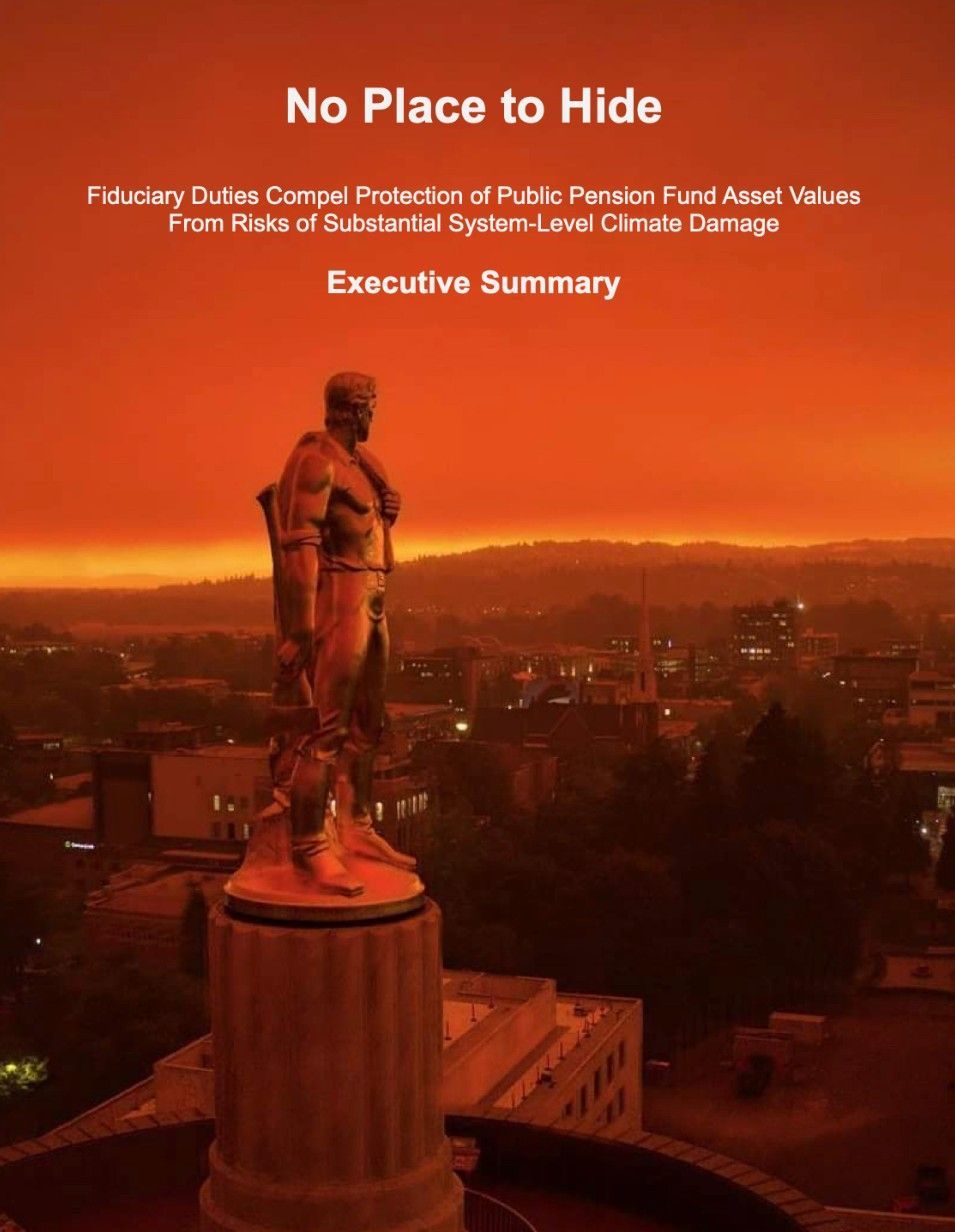
The Oregon State Capitol in wildfire season
2025 Climate Risk Review:
No Place to Hide
May 2025
Published by Divest Oregon
Why This Report?
Public employees around the country depend on their public pension funds for their retirement. In Oregon, 400,000 people - 10% of the state’s population - and their families depend on the Oregon Public Employees Retirement Fund (OPERF).
How does climate change affect the viability of the investments in the fund? How can the managers of OPERF, and other pension funds, protect the financial well-being of current retirees as well as that of younger generations?
To answer these questions, the 2025 Climate Risk Review explores 200 pieces of crucial climate, economic, and investment research by academics, professionals and governments on the risks of climate change on investments.
Climate risk will affect all investments, leaving those responsible no place to hide. There will be no safe harbor for investments.
Our situation is
perilous.
Climate change is a risk like no other. The fires, the floods, and the hurricanes, all tell the story: climate change is undeniable and threatens global economies.
The world is hurtling toward and past 3°C (5.4ºF) average global warming by the end of the century. The hotter it gets, the worse the physical damage, and the worse the economic damage.
“The major point (of the report) is strong, valid and well presented — abating climate change produces economic and investment benefits far outweighing costs.
The stewards of pension fund assets should exercise all the pressure they can to avoid the severest climate outcomes."
RICCARDO REBONATO,
Professor of Finance, EDHEC Business School; Scientific Director, EDHEC Risk Climate Institute; author, “How to Think About Climate Change”
Climate risk is financial risk.
Climate change and the economic damage it wreaks is the mother of all risks to pension funds. Many economists identify substantial financial risks from climate change have predicted 20-40% reduction in asset values means that beneficiaries and their families will experience severe economic hardship.
Unabated climate change cannot be diversified away. With these global changes there will be nowhere to hide; no investments will be left untouched by
climate catastrophe, fossil fuels included.
“No Place to Hide: A Climate Risk Review
by Divest Oregon is a powerful review of the system-level risks that climate change poses to the global economy, and therefore to the investment returns of long-term intergenerational pension funds.
This report makes clear that pension fund fiduciaries need to act in the near term to promote a just clean energy transition if we are going to reduce economic damage from climate change.
This release is a timely and valuable resource which provides practical recommendations and a comprehensive and actionable framework as asset owners, fellow fiduciaries of pension funds and other universal, long-term investors are seeking to align their portfolios with long-term sustainability goals while navigating an ever-evolving regulatory landscape.”
BRAD LANDER,
Comptroller, City of New York
Protecting Pensions for Beneficiaries
Climate Risk Management is a
Core Fiduciary Responsibility
Fiduciary duties don’t change, but investment strategies must adapt in response to the financial risk brought on by climate catastrophe.
Fiduciaries must be impartial - protecting the pensions of young PERS members as well as current retirees.
There is Opportunity in Crisis:
The Path Forward
Public pension funds in the US control nearly $11 trillion in assets of nearly 36 million state and local beneficiaries. The crisis presents an opportunity for public pension funds to influence public policy and the market by their very investments.
Acting together, fiduciaries can move the market by investing in climate solutions, rather than climate destruction.
"Divest Oregon has done essential homework for public pension fund trustees the world over. By chronicling the systemic risks of climate change to retiree benefits,
the 2025 Climate Risk Review gives pension managers a playbook for navigating their fiduciary duties in a heating world."
CLARA VONDRICH, Senior Policy Counsel for Climate, Public Citizen
Reviewed by These Experts:
“The major point is strong, valid and well presented—abating climate change produces economic and investment benefits far outweighing costs. The stewards of pension fund assets should exercise all the pressure they can to avoid the severest climate outcomes."
RICCARDO REBONATO, Professor of Finance, EDHEC Business School; Scientific Director, EDHEC Risk Climate Institute; author, “How to Think About Climate Change”
“The Divest Oregon Coalition has released an excellent, rigorous and comprehensive report that reviews the material climate financial risk for public pension funds. These funds by law must financially protect their beneficiaries today and into the future. The
2025 Climate Risk Review synthesizes over 200 climate, economic and investment research findings by academics, professionals and government to show that managing long-term intergenerational pension funds to protect portfolio asset values from sources of substantial climate risk is a financial decision that is part of fiduciary duty.
The public, as well as pension fund trustees, will benefit from reading and referring to this report in order to understand and implement the paradigm shift required to protect public pension fund asset values from system-level climate risk.”
CLAIR BROWN, Professor of Economics emerita and Director of the Center for Work, Technology and Society at the University of California, Berkeley
“Fiduciaries have an obligation to address risks to their portfolio — and as Divest Oregon has made clear, climate change more than meets that standard. With fires, floods, and storms intensifying across the globe, asset allocators have never faced a more urgent need to understand and navigate the complex interplay between climate events, market transitions, and portfolio management. This report provides a valuable summary of the latest literature on the financial implications of a warming world, and policymakers would do well to consider its conclusions carefully.”
DAN COHN, Energy Finance Analyst, Institute for Energy Economics and Financial Analysis (IEEFA)
"As a climate scientist, I know that urgent action is needed to combat the Climate Emergency. In 2024, the Earth already passed the goal of staying below +1.5°C above pre industrial temperatures. Earth is nearing climate tipping points beyond which reduction in fossil fuels will no longer make a difference. Potentially trillions of people will someday exist - their fate depends on the decisions we make today. We have an enormous opportunity to make such a huge difference for life on planet Earth. That is what moves me.
In this document, Divest Oregon has laid out the physical science alongside the economic consequences of not divesting from fossil fuels and not abating climate change. Divest Oregon shows what should financially move public pension funds: 'Economists overwhelmingly agree that acting now to keep climate change well below the 3°C path we are on will cost far less, and affect asset values far less, than the long-term damage from 3°C global warming.’"
JILLIAN GREGG, Founding CEO, Terrestrial Ecosystems Research Associates (TERA), Corvallis, Oregon; co-author, 2023 and 2024 State of the Climate Reports (BioScience)
WAITING FOR FINAL APPROVAL
“Fiduciary duties include a duty of impartiality -- a duty to act impartially towards all participants. This duty of impartiality requires trustees to treat all trust beneficiaries and beneficiary classes fairly and objectively, and not prioritize the interests of one group over any other. The duty of impartiality is an important and often overlooked cornerstone of the law of fiduciary duty.
Fiduciaries, like public pension plan trustees, must balance the interests of participants who are to retire in the short-term and those whose retirement is in the distant future -- it requires fiduciaries to take into account the retention of the long-term value of the fund and not simply short-term gain. In doing so, fiduciaries must ensure that their decision-making considers the potential transfer of risks between participant generations -- they must preserve intergenerational equity.
"Divest Oregon’s report,
No Place to Hide: Fiduciary Duties Compel Protection of Public Pension Fund Asset Values from Risks of System-Level Climate Damages, highlights the duty of impartiality as it applies to public retirement funds. As the costly effects of fossil fuel consumption accumulate and the climate emergency continues, this report reminds trustees to consider the interests of young plan participants who have an equivalent claim to a secure retirement and fund benefits many years in the future.”
CHARLES SLIDDERS,
Manager & Senior Attorney, Climate Financial Strategies, and
CONOR MACDONALD,
Staff Attorney, Climate Financial Strategies at Center for International Environmental Law (CIEL)
“Divest Oregon has done essential homework for public pension fund trustees the world over. By chronicling the systemic risks of climate change to retiree benefits, the 2025 Climate Risk Review gives pension managers a playbook for navigating their fiduciary duties in a heating world.
The insurance crises in hurricane-prone Florida and wildfire-prone California are just a taste of what’s coming from unabated climate change—rates, deductibles and coverage exclusions increasing, insurance companies leaving, state programs of last resort struggling, and homeowners going without insurance. Public pension fund trustees who keep investing to promote climate change are risking a 20%-40% devaluation of their younger and middle-aged workers' nest eggs. But it doesn’t have to be this way, and this report is a lighthouse on a new course.”
CLARA VONDRICH, Senior Policy Counsel for Climate, Public Citizen
“The findings of this Climate Risk Review make clear that fossil fuel investment as usual is not only environmentally catastrophic—it’s financially imprudent, even reckless. Oregon’s public pension fund faces a foreseeable and preventable collapse in value if we fail to act. We cannot diversify our way out of systemic climate risk. It’s time for fiduciaries to lead with clarity and courage, protecting retirement savings by investing in a climate-safe future.”
AMY GRAY, Associate Director of Climate Finance, Stand.earth
“No Place to Hide: A Climate Risk Review by Divest Oregon is a powerful review of the system-level risks that climate change poses to the global economy, and therefore to the investment returns of long-term intergenerational pension funds. This report makes clear that pension fund fiduciaries need to act in the near term to promote a just clean energy transition if we are going to reduce economic damage from climate change. This release is a timely and valuable resource which provides practical recommendations and a comprehensive and actionable framework as asset owners, fellow fiduciaries of pension funds and other universal, long-term investors are seeking to align their portfolios with long-term sustainability goals while navigating an ever-evolving regulatory landscape.”
BRAD LANDER, Comptroller, City of New York

